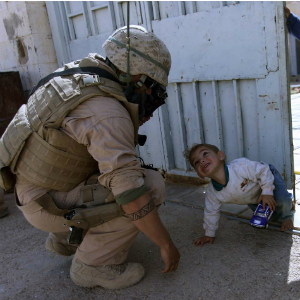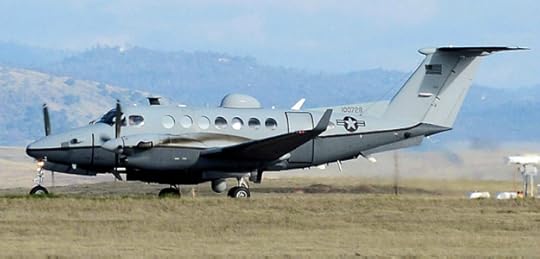Thomas E. Ricks's Blog, page 76
November 21, 2013
Why Obama's drone strategy won’t work: Because that ain't no way to win a war

By Col. Gary
Anderson, USMC (ret.)
Best Defense
department of fourth-generation warfare
If a drone strike hit
the White House during a cabinet meeting, killing the president and his key
advisors and a second took out the chairman of the Joint Chiefs of Staff, it
would be a national tragedy. But the country would not collapse. That is
because the United States is a complex, adaptive system. Such systems don't
have single or even multiple points of failure. Some small tinpot dictatorships
may have discreet points of vulnerability, but most nation-states are very
resilient. That is why this nation's economy and even its airline industry did
not collapse as Osama bin Laden hoped after September 11, 2001.
However, we now know
that al Qaeda and its affiliates are also complex, adaptive systems. Why, then,
do we think that targeting what we consider key terrorists with drone
strikes will bring down their network as a
whole? We lose credibility as organizations such as al-Shabab, which have been
repeatedly targeted, grow stronger even as we claim to have killed key leaders
with our wonder weapons. In Afghanistan, the Taliban, which has been the most
targeted of such organizations, appears to be alive and well even as we
withdraw our combat troops.
This is not an
indictment of the drones themselves or of the Special Forces which also carry
out strikes against key individual terrorist leaders. Both are fine tactical
tools and we absolutely need them in our kit. But they are only tools. By
themselves, they do not represent a strategy. The problem is that our present
leadership simply does not recognize the nature of the war we are fighting.
Indeed, the Obama administration has gone to great lengths to pretend it is not
a war at all. Worse still, people who should know better, are aiding and
abetting them in their self delusion. At least the Bush administration was
honest about the nature of our adversaries; the strategy for defeating al Qaeda
and its allies may have been flawed, but it wasn't self-delusional. The Bush
administration waged war.
Now we have Amnesty
International talking about hauling Americans up on war crimes charges over
drone-related civilian deaths. By classifying drone attacks as law enforcement
operations, the well-meaning liberal lawyers who permeate this administration
have unduly complicated what used to be a war on terror. The law of armed
conflict is much more forgiving regarding noncombatant casualties than the
rules regarding law enforcement, but President Obama has let his staff lawyers
hoist him on his own petard by playing cops and robbers. Al Qaeda is not the
Mafia, and al-Shabab is not the Hole in the Wall Gang.
Al Qaeda and its
affiliated global partners are waging what is now known as Fourth-Generational
War; they are on non-state organizations acting like nation-states. Organized
violence had been reserved as the province of nation-states since the end of the
Thirty Years War. Hezbollah, al Qaeda, al-Shabab, and the Taliban have ended
that. A non-state actor did as much damage to America as the attack on Pearl
Harbor 12 years ago, but the administration is in denial that we are at war at
all. It may be a small war, and it does not demand sacrifices such as rationing
and conscription, but we are facing a very determined foe.
Fighters captured
from such groups should be treated as prisoners of war. That means that they
aren't released until their group gives up or comes to the negotiating table.
If we start treating this war in that manner, the hand wringing about
Guantanamo that we have endured for years will have no basis. The only trials
should be war crimes trials if sufficient evidence exists regarding the crimes.
Drone and commando
strikes alone won't end this war. Often, killing old tired leaders is seen by
more ambitious and ruthless young fighters as a job opportunity -- time to move
up. New leaders, too, should be targeted, but the real key is denying non-state
actors sanctuaries to hatch plots and support more attacks on us. Africans are
leading the way against al-Shabab in Somalia, and Nigerian vigilantes ousted an
al Qaeda affiliate from an entire region in that country. No American
troops were needed, but we should be figuring out how to replicate such behavior
in Yemen and Syria where al Qaeda affiliates are breeding like flies.
Psychological attrition will not work, but it can hurt us badly if we do not
take a realistic view of this Fourth-Generation War and wage it accordingly.
Gary Anderson is a retired Marine Corps
colonel who teaches alternative analysis (AKA "red teaming") at the George
Washington University's Elliott School of International Affairs. He is
currently on sabbatical in Afghanistan. (Tom: Where else would a professor go
on sabbatical?)
November 20, 2013
Actually, some of us still care a lot about Iraq and we are working to understand it

By
Lt. Don Gomez, U.S. Army
Best
Defense guest columnist
Sorry, Jim.
What do I mean? This: I found the posts about
why some people don't care about Iraq anymore to be the exact, precise opposite of my
experience.
I served twice as an enlisted paratrooper in Iraq and it
was that experience, of being in a country we knew so little about, which led
me to separate from the Army and go to school for Middle East Studies. I
studied Arabic in Morocco and Egypt while an undergrad and then went to London
for graduate school. I spent a year there interviewing aging Iraqi veterans in
seedy London pubs for my graduate dissertation on Iraqi military perceptions
of the Iran-Iraq war and the experience of the Iraqi veteran.
I've since rejoined the Army and feel much better prepared
to be dropped into a foreign country -- especially in the Middle East -- and
"do the right thing." I make a concerted effort to read the news
about Iraq -- however dismal -- to see what's going on there precisely because
I have spent a significant amount of time on the ground and back home thinking
about it. This past year, on my blog which is named after a speech
Saddam Hussein gave during the Iran-Iraq War, I've been writing about
my experience in Iraq in 2003, which has been both rewarding and terribly
painful.
And I'm not the only one. A friend of mine who worked on
the controversial Human Terrain System left Iraq and got his Ph.D. in Middle
East Studies and has recently finished his book, The Death of Mehdi Army.
Over the last several years I've met many people who have served and have had
the same or similar experiences. There have been numerous articles written on
the influx of post-9/11 veterans rushing to Middle East studies. FP's Marc Lynch wrote
about it in 2009,
arguing that the influx of post-9/11 veterans may bring more emphasis on Iraq,
which has been largely ignored in Middle East Studies.
So while certainly there are those who are done with it
and want nothing to do with Iraq, there are others, like myself, who feel more
engaged than ever. Whether I like it or not, my existence is forever entwined
with Iraq, and I choose not to ignore it.
Lt.
Don Gomez is a prior service Army officer currently assigned to
Fort Hood, TX. This article represents his personal views and
are not necessarily those of the U.S. Army, the Defense Department, or the U.S.
government.
Bad stuff in Iraq

Mayor of Fallujah shot and killed. Scores killed in bombings. This used to be big news but we have
moved on. Funny how we can do that. And people ask why the Iraqis aren't more
grateful.
For the few who care, here's a good
look at how Turkish relations with the Kurds are changing.
Ever seen a homemade artillery shell?

It looks about like
it does in this photo taken in Syria by the intrepid Michael Yon. More at his blog.
November 19, 2013
Is readiness overrated? I suspect so. And by the way, keeping it is hugely expensive

I know, everyone
unquestioningly worships at the altar of readiness. It rates up there with Mom,
apple pie, and being nice to dogs.
But what if
force-wide readiness for imminent combat is strategically the wrong goal to
pursue? That heretical thought was spurred in part by my reading a transcript
of Defense Secretary Hagel's talk given last weekend in
California. Among other things, he lamented thusly:
The Navy's average global presence is now down more than 10
percent, with particularly sharp reductions in regions like South America. The
Army has had to cancel final training rotations for seven brigade combat teams.
That's more than 15 percent of the entire force, and it now has just two of the
43 active-duty brigade combat teams fully ready and available to execute a
major combat operation. Air Force units lost 25 percent of the annual training
events that keep them qualified for their assigned missions, and Marine Corps
units not going to Afghanistan are getting 30 percent less funding just as the
service is facing more demands for more embassy security and more Marines
around the world.
As I read his
remarks, I kept wondering: Do we really need a military primed to go to war? I
don't think so. Rather, what we need to do is preserve essential skills and
personnel. That might mean going to a cadre-like military, with only two Army
divisions kept at high readiness, likely one light infantry and one armored,
and the other eight active-duty divisions shrunk down but preserving their
skills. That is, with fewer soldiers, but with good training for that smaller
force. That might mean squads entirely of NCOs, trained to expand if and when
necessary.
It also should mean
not spending $12 billion on something like an old-school aircraft carrier. That piece of change would
have paid for an awful lot of training. But no, we now have an entire
generation of flag officers untrained in making hard choices and accustomed to
gamboling about under a never-ending fountain of money. Time to stop spending and
start thinking. If you don't, I bet it will be done for you. So it is really
your choice.
And keep in mind the cautionary example of the
Royal Navy in World War II:
It was the world's biggest and most powerful navy, but because of bad choices
made by its leaders, was largely irrelevant to much of the war.
U.S. Navy drone attacks U.S. Navy ship

I wonder what upset it. You have to be nice around these things.
A reporter seeks help on the performance of the MC-12 Liberty in Af'stan and Iraq

This inquiry comes
in over the transom:
I am a journalist researching the effectiveness
of the Air Force's MC-12 Liberty surveillance and reconnaissance plane in Iraq
and Afghanistan. If you served in a Marine or Army unit in either theater and
you have experience working with the MC-12, especially during combat
operations, and would like to talk about it, please contact me at mfitzgerald[AT]bnd.com or call me at (618)
239-2533. Thanks.
November 18, 2013
Is Obamacare this president's Katrina? If so, it is becoming a national security issue

There sometimes comes a point where an
administration screws up something so badly that the mess colors the entire
presidency. For President Bush, that was Hurricane Katrina in August 2005.
Because of the eerie parallels with the handling of the Iraq war, it spilled
over and undercut the entire Bush approach of bland reassurance that things
were going well in both places.
I fear that Obamacare is doing the same
thing to Obama. (I wrote the preceding four sentences last Thursday night, then
on Friday morning saw that the New York
Times had an article that said pretty much the same thing.
Still true.)
Just when you think things couldn't get
worse, they do. And how about a little accountability? Why does Sibelius
still have her job?
To make things worse, Obama and the
people who cover him seem to think that what is needed is another campaign. I
think that instead is the problem -- too much campaigning, not enough governing.
In one way, this is worse for Obama
than Katrina was for Bush. That's because Democrats will resent the Obamacare
failure more intensely than Republicans did Katrina. Democrats want big
government to look good (and work well) while I don't think that Republicans
really mind if big government looks bad -- it just reinforces their belief in
their core ideological point that big government is bad.
Ia Drang screwed us up in Vietnam because of the lessons we drew from it

By Charles A. Krohn
Best Defense chef de bureau, Saigon
Today we remember the 48th anniversary of
the end of the battle of the Ia Drang, the first big fight that pitted soldiers
from the Army's 1st Air Cavalry Division against North Vietnamese Army regulars
in what amounted to a bloody draw. Both sides licked their wounds, and each
came away believing that the war's outcome would depend on
force-on-force encounters.
This philosophy of war was basically unchanged
in U.S. doctrine until the revolutionary practices seen in Afghanistan and
Iraq gave rise to COIN, or counterinsurgency warfare. The idea of beating an
enemy into submission until he cried "uncle" was seen as costly and
unproductive, failing to focus other aspects of national power. While General
Petraeus is often seen as the godfather of modern COIN, others came
to the same conclusion. The debate now ongoing is what force structure will be
needed for wars of the future, conventional or COIN-ish.
Meanwhile, I also want to celebrate the
courage, endurance, and battlefield bravery of those who fought at Ia
Drang. Woe to any army that doesn't recognize qualities of individual
soldiers who do their duty, whatever the cost. They earned their place in history
for what happened from the 14th to the 18th of November, 1965.
Our failure in Vietnam derived from General
Westmoreland's believing that decisive large-scale engagements
would keep South Vietnam viable. While that may reflect
conventional thinking at the time, it was a strategic error that all the
bravery at Ia Drang cannot erase.
Charles A. Krohn
is the author of
The Lost Battalion of Tet
. Now hanging with his posse in Panama City Beach,
Florida,
he
served in Iraq in 2003-2004 as public affairs adviser
to the director of the Infrastructure Reconstruction Program, and later as
public affairs officer for the American Battle Monuments Commission.
AF LTC found not guilty, but thumbs down for a fraudulent fundraiser for vets

The Air Force officer has been
thoroughly trashed by the entire U.S. media, so it is worth pointing out that
an American jury found him not guilty. He was a hot grabby mess that night,
people testified. But even so, the jury said he didn't do what he was accused
of doing.
Good for the jury system. We tend not
to dwell on it because it isn't politicized, but the more I see of it, the more
I think it is the cornerstone of our democracy. Citizens, drawn from all walks
of life, decide who is guilty and who walks.
Speaking of juries, one in Cleveland
found a guy guilty of running another
fraudulent veterans' group,
the U.S. Navy Veterans Association. Oddly, I think he looks like a
dissolute version of Paul McCartney. Which might be a better version than
someone trying to pretend he is still cute and in his 20s.
Thomas E. Ricks's Blog
- Thomas E. Ricks's profile
- 437 followers



